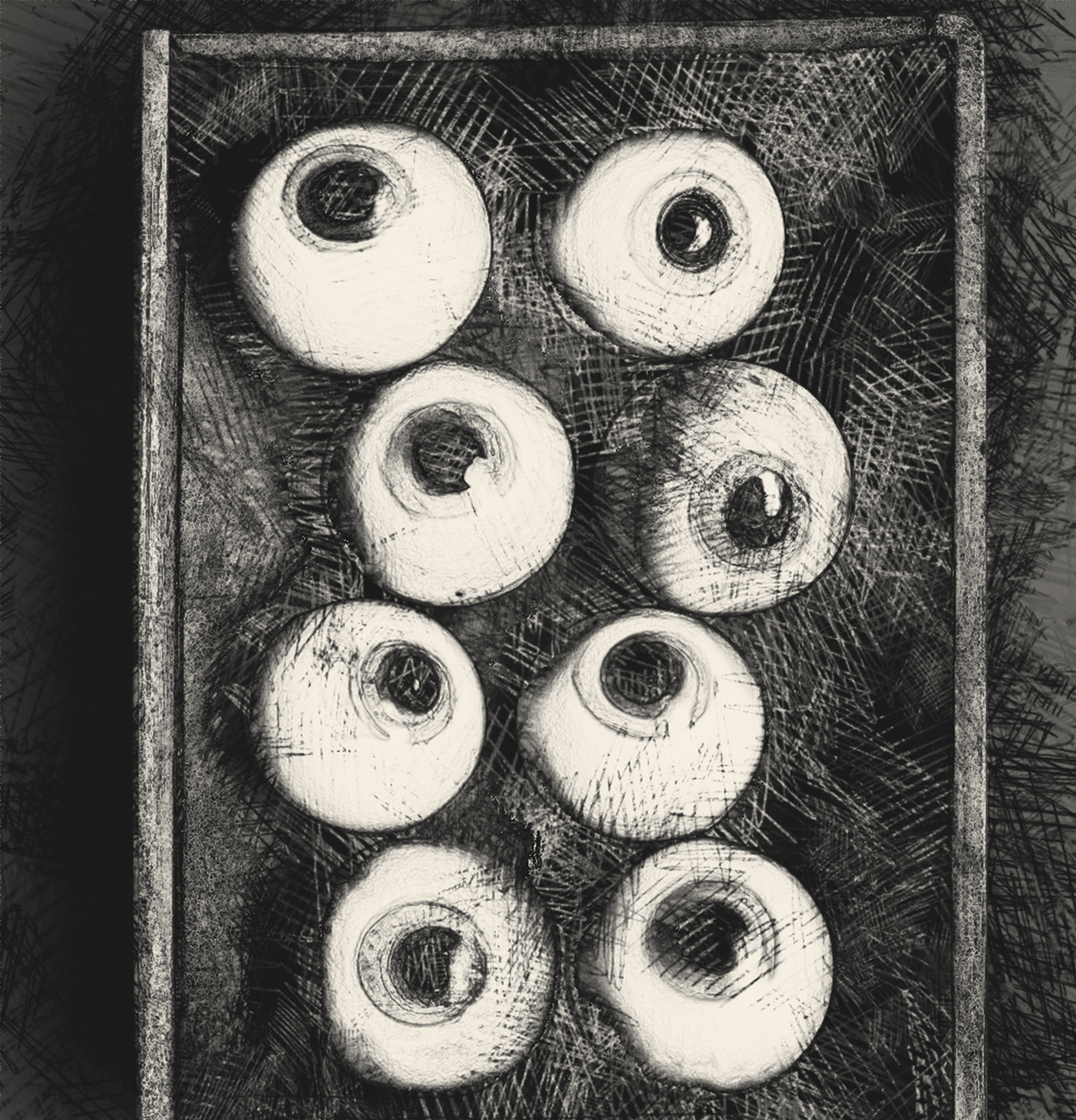Gibbons
by James Morrison
October 2023
An extract from James Morrison’s new novel Gibbons, or One Bloody Thing After Another.
Eyes on a Wooden Floor
A shelf of eyes, polished and unblinking. At night Celeste crept into the workshop, moving gingerly among the leaning panes and stacked rods of frozen glass. Each eye, solid, densely cold, fit neatly into the palm of her small hand.
She would light the small gas lamp over her father’s workbench and slowly roll the eye in the flickering yellow glow. The milky white of the orb; the glittering blue or green or hazel of the iris, shot through with specks of light and dark; the black target of the pupil. Size, her father had explained, was everything. Too small a pupil would make the customer would look shifty, like a criminal. Too large would make them eternally permanently shocked or surprised. Though wider pupils could be attractive in a lady, it was important that both eyes matched. A fraction of a fraction of an inch was all the difference between a normal eye and that of an opium addict.
Sometimes he gave her the eyes that had failed: the orbs too ovoid, or the irises distorted and non-circular, or the pupils doubled-up or misplaced. Glass was a fickle thing. She rolled them like deformed marbles down the wooden floor of the hallway, their different weights and shapes giving each eye its own unique pattern of movement. Even a perfect eye—he had given her one of those, a peculiar but appreciated gift—was not a true sphere, with the little bulge of the cornea disturbing the perfect curve.
Celeste watched her father’s customers with fascination. They would visit regularly but infrequently, every couple of years or so. A glass eye, if well-made, might easily last a lifetime, but the socket’s shape changes with time, necessitating a new lodger. Often the customers wanted to keep their old eyes, having a sentimental if not a bodily attachment to the little creations, but sometimes they sold them back to their maker, who, if he was lucky, might be able to find them a new home in another skull. One customer, a wealthy fidgeter, came frequently for replacements. He could not resist playing with his eye, taking it out, rolling it round and showing it off, dropping it in his friends’ drinks. Soon the eye would be scratched or chipped; would catch the light wrongly, necessitating replacement.
Celeste learned the lore of lost eyes. An eye long dead might be clouded over or rolled back inside the head: an ugly fate, the dead organ best replaced by something glass. The removal was a surgeon’s job–a delicate one. Celeste’s father explained that, through the back of the eye socket, it was possible to gain direct access to the brain. In a way, the eyes were the brain extruding through the skull into the outside world, seeking information. The brain, he explained, rather than the heart, was the seat of thoughts and emotions, of spirit and soul. The heart was a pump, a machine, nothing more. Celeste’s father had wanted to be a surgeon, but had lacked the necessary opportunities. He had studied a little, though, and his knowledge of anatomy was a well of limitless fascination for his eldest child. He loved bodies for both their mechanical perfection and their surprising failures. Often he complimented his wife, Celeste’s mother, on the neatness of her musculature, the tidiness of her facial structure. Though he had no time for phrenology, he fostered a secret belief in physiognomy. The tidier, the more symmetrical a person’s body, the more Celeste’s father liked them. He had no time for the obese or disproportionate, which was why he took such pride in the perfection of the eyes he would make for his customers. He was restoring their symmetry, giving them back their decency. The most painful job he ever had was to make a deliberately mismatched eye for an eccentric farmer, who wanted an iris of gold and a pupil of red. It would keep the stockmen in line, the man had explained, laughing a queer little laugh.
“One man explained his encounter with a hot poker in loving detail, grinning at Celeste’s shivers.”
Celeste was like her mother. Symmetrical and neat, she was her father’s favourite. Her brother had mismatched ears and refused to centre-part his hair, while little Faith had a small rhinoceros-shaped birthmark on the left side of her face. Celeste’s father loved the children dearly, but he was suspicious of their characters.
Celeste grew up within shouting distance of the railway station in Redfern. When her father’s customers arrived there, she would be dispatched down the street to fetch them, bringing them to his workshop. Most were men, from all walks of life. Some had impressive scars, from burns or fights. These were usually the least talkative. A glass eye alone would never hide all the damage that misfortune and bravado had done their faces. They were often big men who walked like bears, embarrassed to be seen being led by a small blonde girl. Others were more friendly, making polite, if condescending, conversation with her, and usually seemed happy to answer her probing questions about the fates of their various lost eyes. Usually they talked of accidents, of flying stones or kicking horses, of tools turned to shrapnel in the middle of use. Occasionally they told her about dramatic fights. One man explained his encounter with a hot poker in loving detail, grinning at Celeste’s shivers. From these men she learned that a glass eye left in place overnight can cause the head to ache horribly the next morning, and that grit on the eye can irritate the orbits of the skull.
Much less common were the women, and these Celeste pitied. It seemed to her that a man who had lost an eye did not really suffer for it. It was just a thing that had happened to him, the inspiration for jokes, for stories, for a little irritation. Even an ugly man could still be a successful man. Some could even turn their ugliness into a strange charisma. But the women seemed so sad, with their gaping sockets in slender faces, with their walks which showed how aware they were of their defect. An ugly woman could not be a successful woman, and even those who kept their beauty acted as though it had gone with their eyes. They talked much less than some of the men, tended not to linger in her father’s workshop. It was brightly lit—this part of Sydney was the first to get electricity, and her father was as enthusiastic about this new technology as he was about everything else that intrigued him—and could be a shock for the self-conscious.
It was at school, through talking to the other girls, that Celeste discovered something strange about her family. Every other girl was named after her father, but her surname was Gibbons, which came from Celeste’s mother. At home she asked her father why this was. He referred to “unpleasantness” down south in one of the other colonies, but would tell her nothing more. ‘Gibbons’ was a safer name to trade under than whatever it was he had abandoned.
On the shelf above the row of eyes, her father kept a row of books. When Celeste was old enough to reach them, she spent hours poring over the massive cloth-bound volumes. Kirke’s Physiology filled numerous pages with discussions of the human eye. She learned why glass eyes could still move like real ones. If well made, and her father’s were always well made, the tightly fitting glass eye could still touch the six ocular muscles. The names of these muscles made a bizarre poetry: internal rectus, external rectus, superior rectus, inferior rectus, superior oblique, inferior oblique. Occasionally a glass eye might slip in place, and then be twitched round by these muscles in a fascinating display of misaligned pupils.
When she was fourteen she was taken out of school in order to help her parents around the house. Her father proudly demonstrated the basic principles of glass-blowing, and the similarity of modern glass-blowing equipment to that which had been used since the seventeenth century. He let her work on eyes of her own, for an hour each evening, after she had helped her mother clean up the dinner plates. Her first was a horrible, bloated thing, with a runny iris and oval pupil, but Celeste’s father explained that she need not fret—it was a fine first attempt.
That November, two passenger trains collided in Redfern station. The noises of screeching, twisted metal, escaping steam and panicked screams reached Celeste and her father in his workshop up the road. He was working on a blue iris, while she was sweeping all of the tiny fragments of glass out from underneath the benches, trying to stay away from the brutal heat of the furnace.
They both ran down to the station, joining a milling crowd of confused, shouting people. The first-class carriage of one train had been lifted clear from the rails by the force of the collision and the momentum of the other train. The locomotive, which had been running backwards—a dangerous practice, as the papers later bemoaned—was driven into one of its own carriages, and partially demolished. The other engine, which had been backed into, was an astonishing sight. The boiler had exploded, its erupting pipes broken and unfurled, pointing in dozens of directions, like her father’s shaving brush rendered in steel, or some industrialist’s nightmare after a meal of spaghetti. The carriages had been filled with scalding steam. Though many of the windows were broken, the iron bars over the shattered glass prevented the passengers from escaping. Celeste saw one man staggering from the wreckage, his forearms denuded by the heat of the steam, his skin hanging down in long, curling, raw strips over his hands like inverted, tattered gloves. But he was more fortunate than the passengers still trapped, who were inhaling the blistering vapour. Choking cries came from the buckled carriages.
Celeste’s father helped drag one man clear of the wreckage, the fellow’s upper body seared and swollen. He could not breathe, and began to choke and thrash about horribly. With the assistance of a hand-wringing policeman, Celeste’s father used his pocket knife to perform a primitive tracheotomy on the gentleman, opening his neck at the throat to allow the passage of air, staunching the flow of hot blood with wads of material torn from the man’s sodden shirt.
When the fellow, now breathing but looking worse than ever, was finally taken off on a stretcher, Celeste stood with her father by the side of the platform, streaked with sooty condensation.
“Ah my darling,” he sighed, putting a hand around his daughter’s shoulders and looking into her wide grey gaze. “What a day! I always knew I had it in me!”
Unsure of how to react, she held his long-fingered hand and gazed into the wreckage.
“Perhaps some of them’ll need new eyes?” she piped. He laughed and ruffled her hair.
“Aye, well, you never know your luck, darling,” he grinned.


